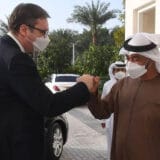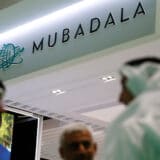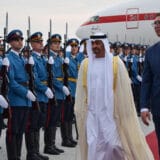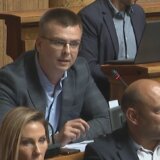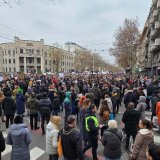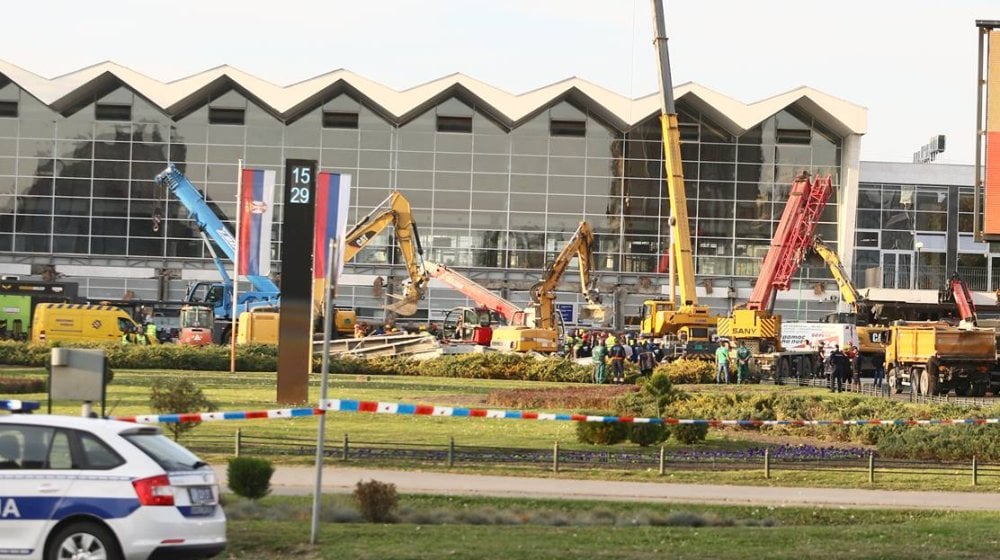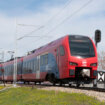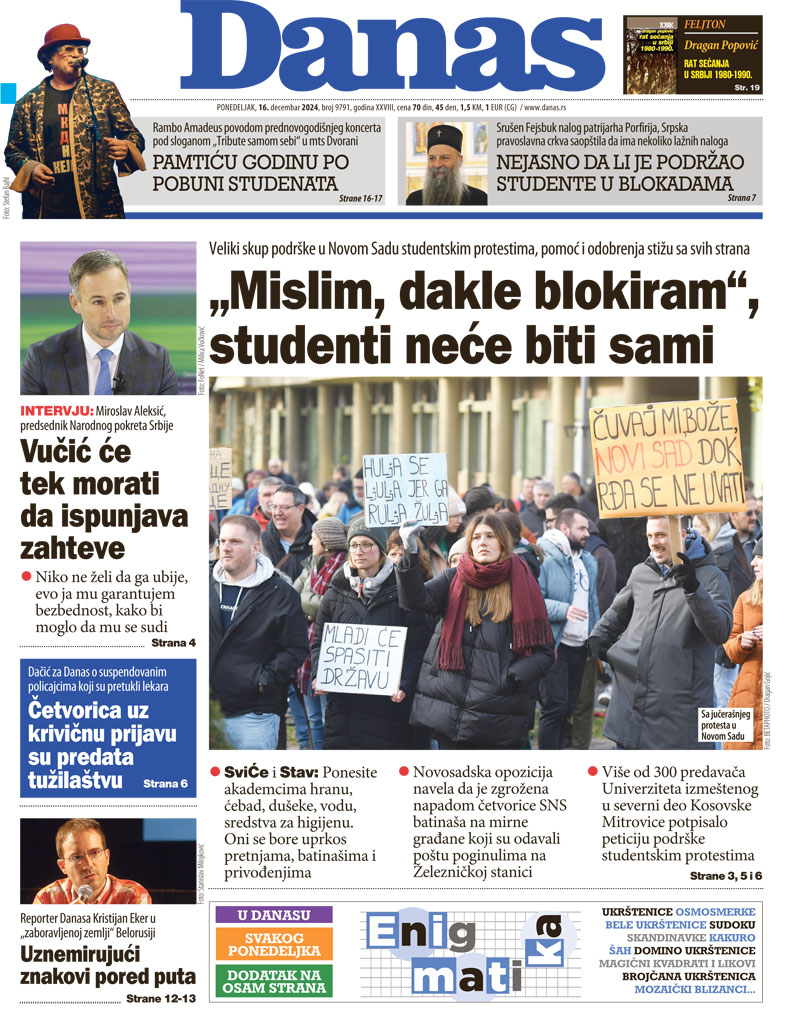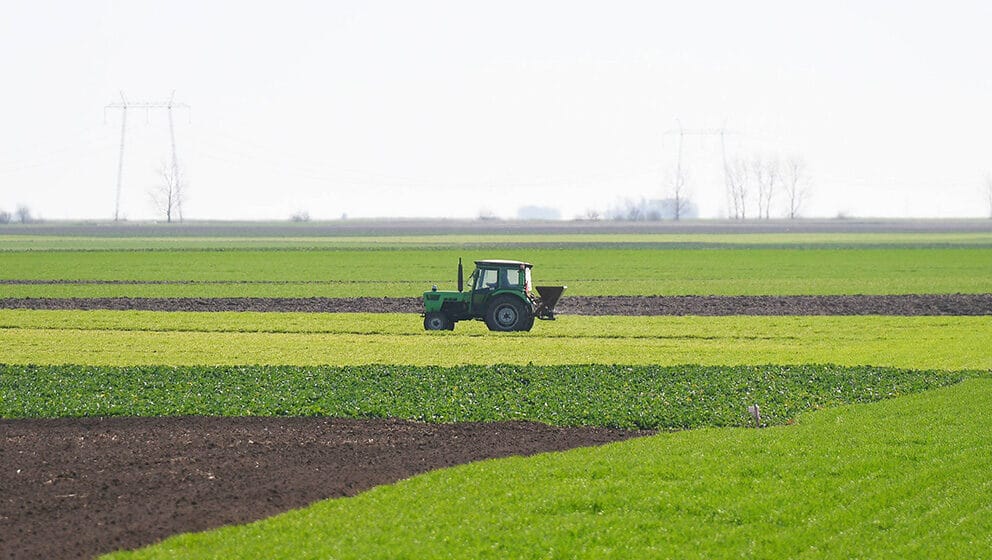 Foto: BETAPHOTO/DRAGAN GOJIĆ/MO
Foto: BETAPHOTO/DRAGAN GOJIĆ/MOPrema ugovoru Vlade Srbije i kompanije Al Rawafed iz jula 2014, zajednička kompanija Al Rawafed Srbija, u kojoj država ima 20 odsto vlasništva, trebalo je da uloži 115,2 miliona evra u prve četiri godine.
For English version, please scroll down
Istim tim ugovorom dobili su na korišćenje više od 10.400 hektara poljoprivrednog zemljišta u Vojvodini.
Da li je taj novac uložen i u šta?
Koliko je kompanija ukupno investirala od 2014. do danas?
Koliko je uložila u izgradnju sistema za navodnjavanje i jesu li izgrađeni?
Koliko je prihoda ostvarila kompanija i koliko je novca isplaćeno Vojnoj ustanovi Morović otkad je kompaniji dato u zakup 3.500 hektara poljoprivrednog zemljišta Karađorđevo?
Da li je svake godine od 2014. do danas, kako je navedeno u ugovoru, 20 odsto godišnjeg profita kompanije isplaćeno VU Morović?
Nepuna dva meseca je prošlo od kako na ova pitanja nismo dobili odgovor Vlade Srbije.
Ni Al Rawafed Srbija, ali ni Ministarstvo odbrane nisu odgovorili na pitanja, ali sudeći prema finansijskim izveštajima ove kompanije daleko su od profita i dobiti i velikog plusa, koji je predsednik Srbije Aleksandar Vučić najavljivao jula 2014. kada je međudržavni sporazum potpisan sa ovom kompanijom iz Ujedinjenih Arapskih Emirata.
TRI GODINE ZAREDOM U GUBICIMA
Prema podacima APR-a, prošlu godinu Al Rawafed Srbija završila je sa neto gubitkom od 63,9 miliona dinara, a godinu pre toga minus je bio veći od 268 miliona dinara.
Neto gubitak 2018. bio je 247 miliona dinara, ali najveća nelogičnost bili su podaci ove kompanije za 2017.
U finansijskom izveštaju ove kompanije za tu godinu navodi se da je neto dobitak bio 148,2 miliona dinara, dok je u finansijskom izveštaju iz 2018. za 2017. prijavljen dobitak od 19,6 miliona dinara.
Razliku od 128 miliona dinara za istu godinu nisu nam objasnili u kompaniji, ali iz APR za Danas kažu da je to posledica korekcija i reklasifikacija uporednih podataka 31. decembra 2017, koje je rukovodstvo društva imalo mogućnost da izvrši u skladu sa zahtevima međunarodnih računovodstvenih standarda, a da su detaljna pojašnjenja dali u napomenama uz finansijske izveštaje za 2018. godinu.
„Na predmetne okolnosti je i revizor skrenuo pažnju u mišljenju o reviziji redovnog godišnjeg finansijskog izveštaja za 2018. godinu. U vezi sa navedenim, saglasno Zakonu o računovodstvu, Agencija za privredne registre ne vrši proveru istinitosti, već samo potpunosti i računske tačnosti finansijskih izveštaja, koje joj, radi javnog objavljivanja, dostavljaju obveznici finansijskog izveštavanja“, ističu u APR-u za naš list.
Nadležnost za nadzor pravnih lica i preduzetnika, u smislu provere ispravnosti evidentiranja poslovnih promena u poslovnim knjigama, data je, kako navode, Poreskoj upravi i ona vrši kontrolu, u skladu sa propisima koji uređuju poreski postupak i poresku administraciju.
„Za istinito i pošteno prikazivanje redovnog godišnjeg finansijskog izveštaja kolektivno su odgovorni zakonski zastupnik, organ upravljanja i nadzorni organ, kao i lice odgovorno za sastavljanje finansijskog izveštaja“, ističu u APR-u i dodaju da se Agencija ne može izjašnjavati o istinitosti podataka navedenih u finansijskim izveštajima za 2017, odnosno 2018. godinu, konkretnog obveznika, imajući u vidu da nema nadležnost za utvrđivanje iste.
U napomeni uz finansijski izveštaj 2018. Al Rawafed navodi da su 2018. ostvarili neto gubitak od 247 miliona dinara.
„Aktivnosti na investicionim ulaganjima u irigacione sisteme iznose 2,2 milijarde dinara od čega je realizovano 883 miliona. Planovima poslovanja u narednim periodima nakon aktiviranja irigacionih sistema, projektovane su različite setvene kulture i viši prinosi, koji će obezbeđivati pozitivne rezultate“, obrazložili su APR svoje finansijske rezultate u Al Rawafed Srbija.
Međutim, ni tri godine kasnije situacija se nije popravila, a zbog izbegavanja odgovora ostalo je i javnosti nejasno koliko se ovaj sporazum državi Srbiji isplatio.
U finansijskom izveštaju za prošlu godinu Al Rawafed Srbija navodi da je od 2,2 milijarde dinara ugovorene vrednosti investicije u irigacione sisteme realizovano ovog puta 537 miliona.
Osim toga, navode i da su 25. maja ove godine od svoje matične firme Al Rawafed Internešnl Investments iz Abu Dabija dobili pismo podrške u kom navode da će im u roku od najmanje 12 meseci pružiti svu neophodnu podršku kako bi nastavili poslovanje u kontinuitetu.
Jedna od najvećih stavki u rashodima ove kompanije jeste kredit koji mora da vraća matičnoj firmi, od koje je ugovorom iz decembra 2014. dobila više od 140 miliona evra, koje treba da vrati u roku od 15 godina, u ratama, uz kamatu na godišnjem nivou od 2,5 odsto.
Iako je tri godine zaredom u gubitku, Al Rawafed Srbija isplatio je 2020. na konto zarada ključnom rukovodstvu koje uključuje, kako navode, članove odbora direktora u bruto iznosu više od 26 miliona dinara. Ista stavka godinu dana ranije bila je 3,4 miliona dinara.
ZEMLJIŠTE U VOJVODINI
Ugovorom je Al Rawafed dobio u zakup 3.500 hektara u Karađorđevu, poznatom Titovom lovištu.
Kupili su i 2.200 hektara zemljišta AD Bačka Sivac za 7.000 evra po hektaru, ali i više od 400 hektara zemljišta Jadrana za 10.000 evra po hektaru, a na korišćenje su dobili i 4.300 hektara poljoprivrednog zemljišta u Kuli.
Zemljište u sklopu Karađorđeva, na primer, do tada su koristili domaći farmeri, koji su pre nego što je Al Rawafed došao u Srbiju zakup plaćali po tržišnoj ceni od 420 do 430 evra po hektaru.
Al Rawafed je ovim ugovorom zemljište u zakup dobio po ceni od 250 evra.
Agroekonomski analitičar Milan Prostran kaže za Danas da nikada nije bio za prodaju poljoprivrednog zemljišta strancima, jer je to neobnovljiv izvor.
„Nikada mi nije do kraja bio jasan taj ugovorni odnos države sa stranim kompanijama, naročito kada se radi o arapskim. Osim Al Rawafeda tu je i Al Dahra, a ima ih još. Pre svega mi nisu jasne obaveze tih kompanija koje su kupile ili zakupile zemljište. U svim tim ugovorima, obavezama i tome ko to prati i nadgleda postoji netransparentnost“, ističe Prostran.
Cena poljoprivrednog zemljišta je, napominje on, u poslednjih 10 godina naglo porasla.
„Sećam se da je najbolja zemlja koju smo imali u Bačkoj 2008. vredela 5.000 evra po hektaru. Kasnije je to naraslo, povećavala se cena, a hektar se plaćao i po 30.000 i 50.000 evra“, naglašava Prostran.
On podseća da je Al Dahra kupila hektar po 4.700 evra, a da ta zemlja mnogo više vredi jer će se zbog puta ka Zrenjaninu prodavati kao građevinsko zemljište.
„Uvek dajem kao primer da Mađarska kao članica EU, koja je imala 10 plus sedam godina pravo da ne prodaje svoju zemlju, da zakon nije prošao u EU, ali referendum o tome da ne treba prodavati zemlju jeste prošao. U današnje vreme kada je najkritičnije stanje hrane, energije i ekologije, hrana mora da se stavi prvo mesto jer se bez nje ne može. Zato bi javnost morala da zna kakvi su ti ugovori kojima se stranim kompanijama daje na korišćenje ili prodaje zemljište i kakve su obaveze tih vlasnika i zakupaca zemlje“, napominje Milan Prostran.
* Sadržaj je rezultat istraživanja sprovedenog u okviru projekta „Transparentnost učešća države u stranim investicionim projektima“. Stavovi izneti u tekstu su stavovi autora i ne izražavaju nužno stavove donatora.
ENGLISH VERSION
While the UAE company’s 2.2 billion dinars investment in irrigation systems is going very slowly, the loans are punctually paid back to the Emirates.
Al Rawafed Recording Losses for Three Years, Irrigation Not Even in Sight
According to the July 2014 agreement between the Government of Serbia and the Al Rawafed company, the joint company Al Rawafed Serbia, with 20% of the state ownership, was supposed to invest 115.2 million euros in the first four years. As provided by the same contract, they were given more than 10,400 hectares of agricultural land in Vojvodina. Has this money been invested as provided by the contract and in what? How much has the company invested in total since 2014? How much income has the company generated and how much money has been paid to the Morović Military Institution since the company leased 3,500 hectares of agricultural land in Karađorđevo? Since 2014, has the company met its obligation defined in the contract of paying 20 percent of the company’s annual profit to the Military Institution Morović every year?
We asked the Government of Serbia these questions almost two months ago and we have not received any response yet. Al Rawafed Serbia and the Ministry of Defense have not provided any answers to these questions either, but, judging by the financial reports of this company, they are as far from making any profit as they are far from a hefty financial gain announced by Serbian President Aleksandar Vučić in July 2014, when an interstate agreement was signed with this company from the United Arab Emirates.
LOSSES FOR THREE YEARS IN A ROW
According to the Serbian National Business Registry data, Al Rawafed Serbia ended last year with a net loss of 63.9 million dinars, and the year before with a deficit of more than 268 million dinars. The net loss in 2018 was 247 million dinars, but the biggest inconsistency was recorded in the data this company provided for 2017. The company’s financial report for 2017 registered a net profit of 148.2 million dinars, while the 2018 financial report referred to the 2017 profit of 19.6 million dinars. Although the company declined to explain us the difference of 128 million dinars for the same year in two subsequent reports, the National Business Registry told Danas that this discrepancy was a consequence of corrections and reclassifications of comparative data on December 31, 2017, which the company’s management had the opportunity to perform in accordance with International Accounting Standards and provided detailed explanations in this regard in the narrative to the financial report for 2018.
„The auditor also drew attention to the aforementioned circumstances in the opinion on the audit of the regular annual financial report for 2018. To this end, in accordance with the Law on Accounting, the Business Registry Agency does not check the truthfulness, but only the completeness and calculation accuracy of financial reports, which are submitted to it by financial reporting entities for public disclosure „, the Agency pointed out in the statement provided to our newspaper.
As they further explained, jurisdiction over the supervision of legal entities and entrepreneurs, in terms of checking the correctness of recording business changes in the business books, is vested in the Tax Administration, which performs control, in accordance with the regulations governing the tax procedure and tax administration.
„The legal representative, managing body, and supervisory body, as well as the person responsible for compiling the financial report, are collectively responsible for the true and accurate presentation of the regular annual financial report,“ the National Business Registry Agency noted, adding that the Agency cannot comment on the information provided in the financial statements for 2017 and 2018 of the taxpayer in question, as it is within the Agency’s competencies.
In the narrative to the financial report for 2018, Al Rawafed stated that they had recorded a net loss of 247 million dinars.
„Activities related to the investments in irrigation systems amount to 2.2 billion dinars, of which 883 million were realized. The business plan projects a number of different seed crops and higher yields in the period following the activation of irrigation systems, which will secure positive results in the future „, Al Rawafed explained its financial results in the report submitted to the Agency.
However, three years later, the situation has not improved yet, and due to the absence of answers to our questions, the profitability of this agreement for the state of Serbia has remained unclear to the public.
In the last year’s financial report, Al Rawafed Serbia declared that out of 2.2 billion dinars of the contracted value of the investment in irrigation systems, 537 million had been realized this time. In addition, they noted that they had received a letter of support from their parent company Al Rawafed International Investments from Abu Dhabi on May 25 of this year, stating that they would provide them with all the necessary support to continue their business in continuity for at least 12 months. One of the largest items in the company’s expenses is the 15 year loan in the amount of 140 million euros that the Al Rawafed Serbia has had to pay back to the parent company in installments, with the annual interest of 2.5 percent.
Although it has recorded loss for three years in a row, in 2020, Al Rawafed Serbia paid more than 26 million dinars for gross salaries of its key management, i.e. to the members of the board of directors. The same item was 3.4 million dinars a year before.
THE LAND IN VOJVODINA
Under the agreement, Al Rawafed leased 3,500 hectares in Karadjordjevo, Tito’s famous hunting ground, and they also bought 2,200 hectares of land of AD Bačka Sivac for 7,000 euros per hectare, and more than 400 hectares of land of Jadran for 10,000 euros per hectare. Furthermore, they were given farming tenancy rights for 4,300 hectares of agricultural land in Kula.
Until then, the Karadjordjevo land was used by domestic farmers, who, before Al Rawafed came to Serbia, paid rent at a market price of 420 to 430 euros per hectare. Under this contract, Al Rawafed leased the land at a price of 250 euros.
Agro-economic analyst Milan Prostran says for Danas that he has never supported the sale of agricultural land to foreigners, because it is a non-renewable source.
„I have never fully understood the state’s contractual relationship with foreign companies, especially when it comes to the UAE companies, as, apart from Al Rawafed, there is also Al Dahra, and other companies, too. First of all, the obligations of those companies that bought or leased the land are not clear. All these contracts are marked by non-transparency, without clear obligations of a buyer or renter, and without clear monitoring and supervision of implementation of these obligations“, Prostran points out.
The price of agricultural land, he notes, has risen sharply in the last 10 years.
„I remember that the best land we had in Bačka was worth 5,000 euros per hectare in 2008. As the time went by, the price substantively increased, and a hectare was paid 30,000 and 50,000 euros,“ Prostran notes.
He reminds that Al Dahra paid 4,700 euros per hectare of the land that is worth much more, as it will be resold as construction land for the new motorway to Zrenjanin.
„I always refer to the case of Hungary that, as an EU member, had a ten year + seven year moratorium on the sale of the land. Although the law did not pass in the EU, the referendum on the moratorium on the sale of the land did. The most critical issues of the modern times are food, energy, and ecology, but food must be put first, because life is impossible without it. This is why these contracts that sell or lease land to foreign companies must be fully available for public scrutiny and the obligations of the foreign land owners and tenant farming companies must be clearly defined and enforced“, Milan Prostran concludes.
* The content is the result of the research carried out within the project „Transparency of State Participation in Foreign Investment Projects“. The views expressed in the text are those of the authors and do not necessarily reflect the views of the donor.
Pratite nas na našoj Facebook i Instagram stranici, ali i na X nalogu. Pretplatite se na PDF izdanje lista Danas.

